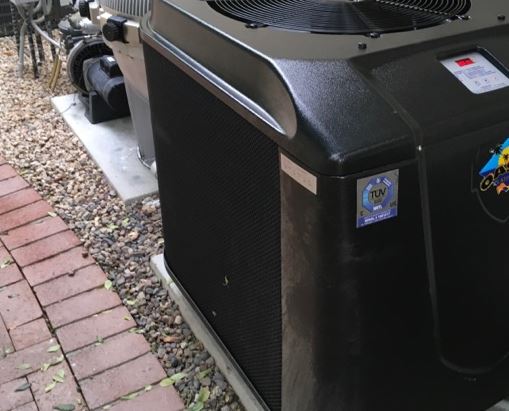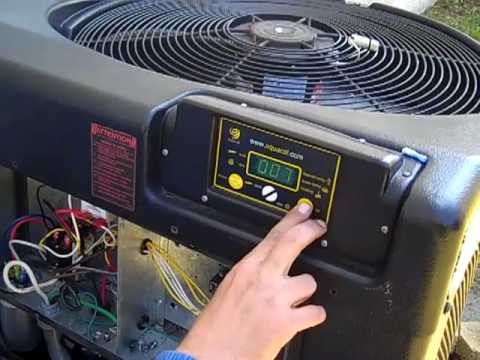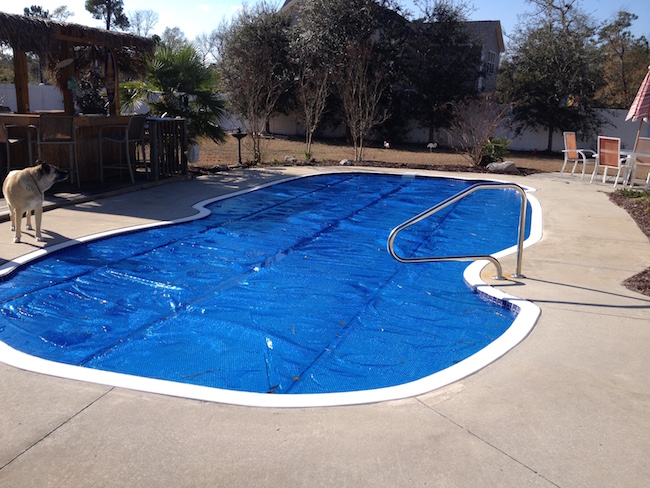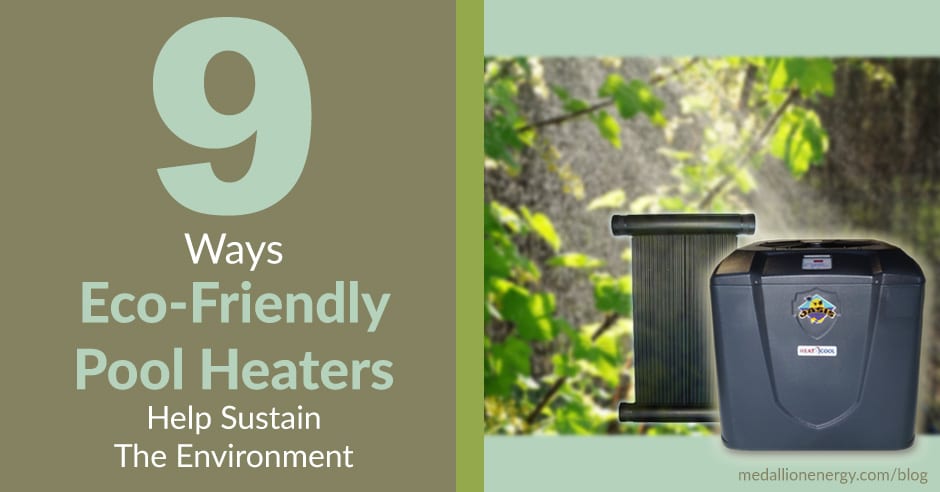The planet we live on is beautiful. And at this point, we all know that we have to treat it well to keep it that way.
This is why many pool owners strive to create environmentally friendly swimming pools. Pools with great energy efficiency, low waste output, and light “carbon footprints. And when it comes to warming up the water, choosing an eco-friendly pool heater is essential.
While all pool heaters can warm up a pool, not all pool heaters are made equal. Some are designed for performance and speed, others for efficiency and flexibility. They’re also each powered differently. While some heaters run on gas and others electricity, others rely on solar heat and even solar rays themselves.
Today, we’re focusing on eco-friendly pool heaters. The pool heaters that give you the most heat for your pool with the lightest impact on the environment. And in this post, we’ll show you 9 ways that eco-friendly pool heating can accommodate your pool heating needs while making the planet greener.
Solar heaters only rely on the sun, no gas burning involved

When most people think of heat, they think of fire. Things burning. That’s the idea of heat in it’s most basic form.
But these days, we have a number of methods for generating heat. Take solar pool heaters for example. While traditional pool heaters burn gas to produce heat, solar heaters generate 100% of their heat from the sun.
With the help of special solar panels, a solar heating system collects heat via sunshine. It then transfers that heat to your water. No gas or heating elements involved – just natural, solar heat moved around by your pool pump.
And since there’s 0 gas involved, you’re rewarded with a healthier ozone layer and cleaner air.
Solar heaters and heat pumps reduce C02 emissions
While solar heaters provide a truly green pool heating experience with the exclusion of c02 emissions, they’re not the only heaters that do. Pool heat pumps are just as eco-friendly, and also make great use of the sun.
But not the sunshine, but rather solar heat itself. While heat pumps don’t use gas or panels to generate heat, they do use the heat the sun produces. With the help of an advanced refrigerant system, heat pumps absorb heat from the ambient air and turn it into usable heat for warming up your water.
And on the topic of refrigerants..
Heat pumps use an eco-safe refrigerant to harvest natural heat from the ambient air

“Refrigerants? How are chemicals like that eco-friendly”?
Glad you asked because usually, they’re not. But pool heat pumps solve this challenge head-on by using a special, eco-friendly refrigerant known as R410A.
It works like any other refrigerant but is made with fluorine instead of chlorine or bromine (traditional refrigerants). And it’s that small difference in ingredients that makes R410A ozone safe.
Learn more about how a pool heat pump works here:
Long lasting corrosion resistant parts help minimize waste
These days, most products just aren’t built to last. We live in a buy-replace society. We’re trained to replace things as soon as they stop working with little thought towards how much waste it adds up to.
And while repair and troubleshooting is always a good choice, sometimes it’s just not an option. So what’s the solution?
Longer lasting products. And that’s exactly what pool heat pumps like the Oasis Platinum deliver on.
The pool heat pump includes corrosion-resistant parts that contribute to prolonging the unit’s lifespan. With more durable parts, there’s less to replace, and therefore less waste produced.
Other heating options aren’t as tough and need replacement within 10 years or less. Heat pumps last decades.
Onboard diagnostic tests and troubleshooting codes help reduce unit breakdown

Did you know that most heat pumps include an onboard diagnostics and troubleshooting?
From the front of the pool heat pump’s display, a pool owner can see a variety of information. For instance, if the pool heater is experiencing a problem, the unit displays an error code that lets you know what’s wrong and what to replace.
In other cases, it may even alert you to a problem elsewhere in your system. While this notification system may seem small, it’s capable of extending your heater’s lifespan and saving you money.
How?
By giving you the chance to fix the small problems before they turn into big ones. And that’s the difference that leads to way fewer repairs and expensive replacements down the road. But most importantly, and once again, less waste.
A heat pump’s energy efficiency lets you easily warm your pool with a minimal pull on resources
Most people are drawn to gas pool heaters for one reason: speed.
They warm up your pool faster than any other pool heater. But as you know, that speed comes at a cost. A price that your wallet and the environment has to pay.
Gas isn’t cheap, and C02 emissions are no good for a greener earth.
On the other hand, pool heat pumps can warm up that same pool at a much lower cost, without the harmful emissions. For reference, heat pumps cost about 1/3 of what gas heaters cost each month.
Solar heaters can also do a decent job warming up your water as long as the sun is out. And at just the cost of running your pool pump.
They pair great with solar covers, which KEEP your pool warm naturally

While eco-friendly pool heaters are definitely healthier for planet earth, they do still have a slight pull on resources. Energy specifically. Luckily, there’s a way to reduce this pull.
Solar covers.
Think of a solar cover as a lid for a pot of water. IF you want the pot of water to heat up faster and stay warmer longer, what do you do?
You cover it, with a lid.
That’s exactly what a solar cover does. It helps your pool retain heat more effectively. In fact, by using a cover, you can reduce heat loss by up to 75%. ‘
That’s a huge difference. As you know, lower energy use means lower swimming pool bills. So if better heating wasn’t incentive enough, hopefully saving money and limiting energy use is.
Here are a few different solar cover options:
- Solar pool covers
- Thin and flexible, “bubble-wrap” plastic sheets that stretch across your water and form an insulating barrier
- Solar rings
- Individual solar hoops that float and connect via magnets to form a single “pool cover”
- Liquid solar covers
- A swimmer-safe chemical based alternative to pool covers. This liquid barriers sits on the surface of your water and reduces evaporation
Choosing eco-friendly pool heaters lowers gas demand
Consider this for a chain of events:
- You buy an eco-friendly pool heater
- You tell a friend about it
- They tell one of their friends
- Another person buys one
- This makes eco-friendly pool heaters more popular
- In response, more companies push their heat pumps and solar heating systems (this is actually happening)
- As gas pool heater sales decrease so does the demand for gas
Low nox gas heaters offer a slightly “greener” option for fast heating
While gas heaters clearly aren’t the stars of this post, it’d be unfair not to mention the latest developments in that field: low nox heaters.
Traditional gas heaters produce a considerable amount of C02 emissions. But their newer alternative, low nox heaters are designed differently.
While they generally still look and work the same, these heaters are specifically designed to produce less nitrous oxide emissions than their predecessors. Hence the name, “low nox”.
If you liked this post, you might also like:
- 7 Secrets For Keeping Your Swimming Pool Crystal Clear
- 9 Ways Owning a Pool Heat Pump Improves Your Health & Your Life
